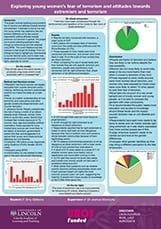By Amy Gibbons //
 This project attempts to explore how and why young women may experience fear towards terrorism and extremism differently to men, and to also explore respondents’ political attitudes towards extremism and terrorism in general. This project involved collecting quantitative data through an online survey and analysing it using SPSS, as well as conducting an in-depth literature review to help situate the findings. The focus on women comes from looking at the literature and finding there is a lack of research on gender differences and research has shown that women are more fearful of crime in general. This is thought to be due to the “shadow of sexual assault”, and this fear is thought to ‘shadow’ other fears, like terrorism. From our findings we hope to highlight any improvements to counter terrorism policy and to also discuss and make more people aware of how such policies impact women.
This project attempts to explore how and why young women may experience fear towards terrorism and extremism differently to men, and to also explore respondents’ political attitudes towards extremism and terrorism in general. This project involved collecting quantitative data through an online survey and analysing it using SPSS, as well as conducting an in-depth literature review to help situate the findings. The focus on women comes from looking at the literature and finding there is a lack of research on gender differences and research has shown that women are more fearful of crime in general. This is thought to be due to the “shadow of sexual assault”, and this fear is thought to ‘shadow’ other fears, like terrorism. From our findings we hope to highlight any improvements to counter terrorism policy and to also discuss and make more people aware of how such policies impact women.
The project began delayed due to ethical approval taking most of June, followed by slow responses to the survey, so data collection lasted most of July. We predicted to get over 300 responses but a more educated prediction would have been around 100 and this is one important aspect of conducting research that I have learnt for next time. We were also unable to get any participants for the semi-structured interviews, but in hindsight, due to delays, it would have been hard to conduct them, transcribe and analyse them all within the time frame.
From carrying out this project, I have learnt valuable lessons to use with my future studies and career prospects, especially time keeping, planning, expanding on my level 1 SPSS data analysis skills, as well as learning how to use Qualtrics. It has also been a pleasure to dedicate my summer to spend time learning more about terrorism and counter terrorism policies and how they impact our civil rights.
Working with my supervisor, Joshua, was great as he gave so much time helping with the more difficult aspects of the project such as the ethics form and creating the survey on Qualtrics, which I had not used before. He also gave me more responsibilities and independence when it came to analysing and making my own conclusions from the data, as well as giving me the opportunity for an A-level student to shadow me for the week. I was able to help her understand the research process as well as what it is like studying criminology and university life in general. We also had the opportunity to observe at the magistrate’s court for a day which was insightful.
This experience of taking part in the UROS project has definitely made me more certain in perusing postgraduate studies, as well as career in social science research. I would encourage anyone who is interested in research and enjoys studying to take part in this. It has been a pleasure to represent the School of Social and Political Sciences, and I thank the UROS project for allowing me to take part and supporting me throughout.
*To view Amy’s project poster, please click on the thumbnail below:
